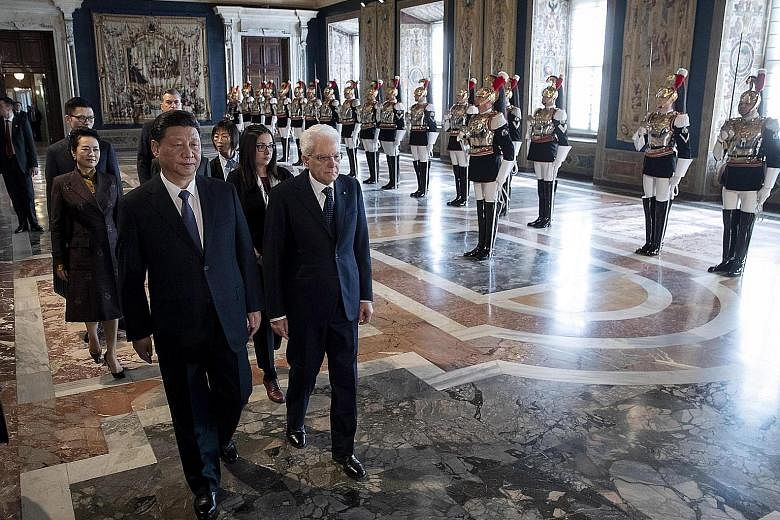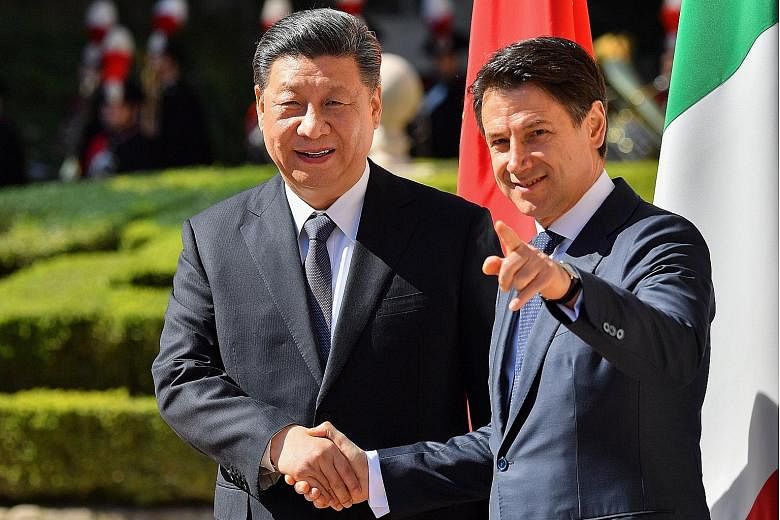ROME • Making a three-day visit to Italy, Chinese President Xi Jinping arrived at Rome's presidential palace with a cavalry escort usually reserved for royals.
Italy pulled out all the stops for an economic superpower promising billions in investment and trade deals in exchange for officially signing on to China's vast new Silk Road project.
Mr Xi and Italian Prime Minister Giuseppe Conte yesterday signed a memorandum of understanding in which Italy will officially join the Belt and Road Initiative (BRI).
Chinese and Italian companies were also set to sign 10 accords potentially worth as much as €20 billion (S$30.6 billion) at a ceremony attended by Mr Xi yesterday, according to an Italian official who declined to be named.
Those involved in the business accords will include gas pipeline operator Snam, engineering company Ansaldo Energia and leading banks, people with knowledge of the matter have said.
But even as President Xi and his wife were serenaded at a state dinner last Friday by Italian singer Andrea Bocelli, the leaders of France, Germany and other European Union states huddled in Brussels hoping to strengthen the continent's defences against what they considered to be China's economic incursion.
The disconnect between the two scenes laid bare the divisions and tensions in the EU, caught in the middle of a trade war between the United States and China, while trying to find its bearings and assert its power in a volatile era of shifting geopolitical alliances and American retrenchment.
"China plays on our divisions," French President Emmanuel Macron, speaking in Brussels, told reporters last Friday, adding that the EU had finally woken up to China. "The period of European naivete is over."
But stalling China's success on the continent will be easier said than done. Italy may be just the latest economic partner for China in Europe, but it is a significant one.
It is the first member of the Group of 7 nations that once dominated the global economy to take part in China's vast BRI project, a sign of how a rising China is reshaping the world's economic and political order.
France and Germany, which are now leading the call for greater "reciprocity" in economic relations with China, already have some of the largest stakes in continuing to lure Chinese trade and investments.
There is growing concern, in fact, that China has arrived in Europe not as an economic collaborator, but as a conqueror.
The European Commission has called China an "economic competitor" in critical industrial fields and a "systemic rival" politically, in a tough paper issued recently.
European Commission president Jean-Claude Juncker repeated that refrain on Friday, saying "the Chinese market is not sufficiently open to European companies, and we must change this".
Their wary eye on Chinese investments is not necessarily new, but it is intensifying.
The tightening relationship between China and Italy has worried US officials, who have tried and failed to stop the deal, expressing concern that China's economic expansion is a precursor to military and political ambitions.
EU leaders in Brussels have also raised fears that Italy - saddled by debt, and tempted by promises of hundreds of millions of euros in infrastructure investment - could fall prey to a Chinese divide-and-conquer strategy.
Critics of the Italian government have called the deal with China yet another example of its dangerous naivete and incompetence.
Italian leaders have argued that there is nothing to be concerned about. Italy, they say, will avoid China's debt traps, and its laws prevent foreigners from taking control of its ports, as China has done in Piraeus, Greece. Mr Conte has defended the deal, saying Germany and France have considerably more business with China.
But critics of the government in Rome do not find these guarantees reassuring.
A full-page cartoon on the front page of last Thursday's Il Foglio, a newspaper critical of the government, showed Prime Minister Conte leading an enormous, fire-breathing Chinese dragon with a short leash. In the cartoon, Mr Conte says: "Take it easy guys, I can manage him. He practically eats from my hand."
NYTIMES, BLOOMBERG


